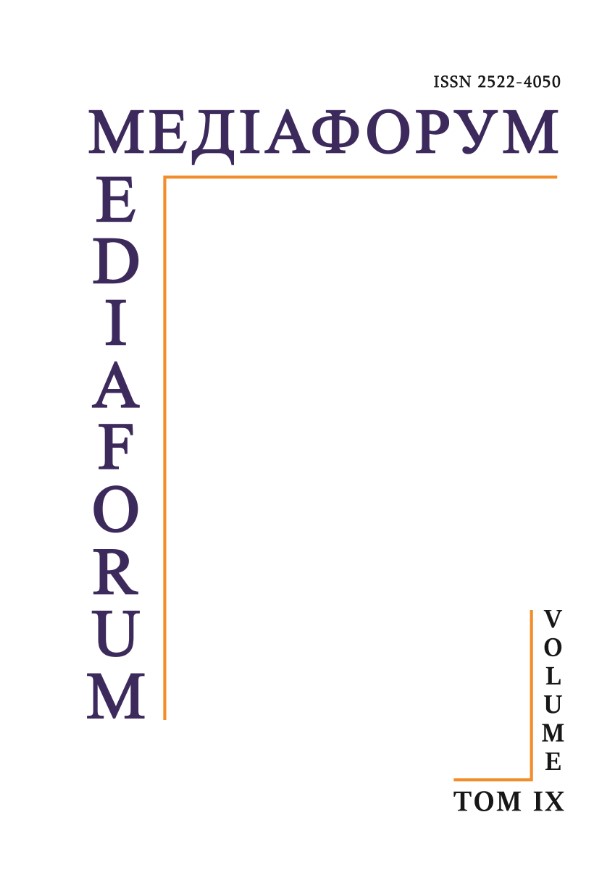Протидія дезінформації в Європейському Союзі: правовий аспект
DOI:
https://doi.org/10.31861/mediaforum.2021.9.245-262Ключові слова:
Європейський Союз, дезінформація, соціальні медіа, маніпулювання, HLEGАнотація
Стаття присвячена аналізу є аналіз основних документів Європейського Союзу щодо протидії дезінформації в європейському інформаційному просторі.
Дослідниця констатує, що активно протидіє дезінформації з 2015 р., оскільки приймає ряд нормативних документів для протидії даній інформаційній загрозі, зокрема, в 2016 р. прийнято документ «Спільні рамки протидії гібридним загрозам - відповідь Європейського Союзу» («Joint Framework on countering hybrid threats a European Union response»), 2018 р. «Плану дій щодо протидії дезінформації» (Action Plan against Disinformation)
В результаті низки ініціатив та проектів європейських інституцій у 2018 р. було опубліковано саморегулюючий «Кодекс поведінки з протидії дезінформації» (Code of Practice on Disinformation), що був підписаний найбільшими інтернет-платформами та соціальними медіа (Google, Facebook, Twitter та Mozilla) у рамках діяльності з саморегуляції ЗМК.
Потрібно відзначити, що впровадження «Кодексу практики Європейського Союзу щодо протидії дезінформації» дав неоднозначні результати. Саморегулювання було першим логічним та необхідним кроком, однак через рік мало хто із зацікавлених сторін був повністю задоволений процесом чи результатом. Не було вибудовано глибокої довіри між промисловістю, урядами, науковими колами та громадянським суспільством.
Завантажити
Посилання
Hrebeniuk, M.V. ta Leonova, B.D., 2019. Problemy protydii poshyrenniu destruktyvnoi propahandy ta dezinformatsii naperedodni vyboriv: analiz dosvidu YeS. Informatsiia i pravo. № 2 (29). S.82-89. Available at: http://ippi.org.ua/sites/default/files/11_12.pdf
Karpchuk, N.V., 2019. Stratehichna komunikatsiia YeS yak zasib u borotbi z dezinformatsiieiu. Politychne zhyttia. № 1. S. 52-58. https://doi.org/10.31558/2519-2949.2019.1.7
Chernysh, R., 2019. Pravovyi dosvid krain Yevropeiskoho Soiuzu u sferi protydii poshyrenniu feikovoi informatsii. Informatsiine pravo. № 10. S. 123-129.DOI https://doi.org/10.32849/2663-5313/2019.10.21
«Disinformation and the EU: tackling the virus of fake news on the ground». 12 June 2020. https://www.pescor.eu/disinformation-andeu-tackling-virus-fake-news-ground
Centrum Dokumentacji Europejskiej. 2018. «Europa, która chroni: UE intensyfikuje działania dotyczące dezinformacji». 5 grudnia 2018. Komisja Europejska. Komunikat prasowy IP/18/6647 https://ec.europa.eu/commission/presscorner/detail/pl/IP_18_6647
ERGA. 2020. Report on disinformation. Assessment of the implementation of the Code of Practice, 2020. https://erga-online.eu/wpcontent/uploads/2020/05/ERGA-2019-report-published-2020-LQ.pdf
EU Action Plan on Strategic Communication. 2015. (Ref. Ares(2015)2608242 - 22/06/2015). https://www.allbusinesstemplates.com/preview/NBV5A/YCSGH/1/
European Centre of Excellence for Countering Hybrid Threats (Hybrid CoE) https://www.hybridcoe.fi/
European Commission. 2018. Action Plan against Disinformation. European Commission contribution to the European Council. Brussels, 5.12.2018 JOIN(2018) 36 final. https://ec.europa.eu/info/sites/info/files/eu-communication-disinformation-euco-05122018_en.pdf
European Commission. 2018. Synopsis report of the public consultation on fake news and online disinformation. Consultation Results. 26 April 2018. https://ec.europa.eu/digital-single-market/en/news/synopsis-report-public-consultation-fake-news-and-onlinedisinformation.
European Commission. 2018. Tackling Online Disinformation: A European Approach. April 26, 2018, https://eur-lex.europa.eu/legalcontent/EN/TXT/?uri=CELEX:52018DC0236
European Commission. 2021. «EU Code of Practice on Disinformation. 2018». https://digital-strategy.ec.europa.eu/en/policies/code-practice-disinformation
European Commission. 2021. «Tackling online disinformation». https://ec.europa.eu/digital-single-market/en/tackling-onlinedisinformation
European Commission. 8 March 2021. «Coronavirus: new reports by online platforms include specific measures taken against vaccines». Shaping Europe’s digital future. https://ec.europa.eu/digital-single-market/en/news/coronavirus-new-reports-online-platforms-include-specificmeasures-taken-against-vaccines.
European Commission. 8 March 2021. «Fourth intermediate results of the EU Code of Practice against disinformation». https://digitalstrategy.ec.europa.eu/en/news/fourth-intermediate-results-eu-codepractice-against-disinformation
European Commission. 8 March 2021. Fourth set of reports – Fighting COVID-19 disinformation Monitoring Programme. 10 December 2020. Shaping Europe’s digital future. https://ec.europa.eu/digital-singlemarket/en/news/fourth-set-reports-fighting-covid-19-disinformationmonitoring-programme
European Commission. Communications Networks, Content and Technolog. 2018. A multi-dimensional approach to disinformation. Report of the independent High level Group on fake news and online disinformation. March 2018. Р. 5-6. https://op.europa.eu/en/publicationdetail/-/publication/6ef4df8b-4cea-11e8-be1d-01aa75ed71a1
European Commission. Joint Framework on countering hybrid threats a European Union response. 2016. Brussels, 6.4.2016 JOIN(2016) 18 final. https://eur-lex.europa.eu/legal-content/EN/TXT/PDF/?uri=CELEX:52016JC0018&from=EN
Balcewicz, Justyna. 2018. «Kodeks postępowania w zakresie zwalczania dezinformacji». CiberPolicy. NASK. 18 października 2018/https://cyberpolicy.nask.pl/kodeks-postepowania-w-zakresie-zwalczaniadezinformacji
Bennett, W. Lance and Steven, Livingston ed. 2020. A Brief History of the Disinformation Age. Information Wars and the Decline of Institutional Authority. Р.3-43. The Disinformation Age. Politics, Technology, and Disruptive Communication in the United States, 2020. University of Washington Cambridge University Press. DOI: https://doi.org/10.1017/9781108914628
Bradshaw, Samantha, and Philip N. Howard. 2019. The Global Disinformation. Order Global Inventory of Organised Social Media Manipulation. University of Oxford. https://comprop.oii.ox.ac.uk/wpcontent/uploads/sites/93/2019/09/CyberTroop-Report19.pdf
Newman, Nic and other. 2018. Digital News Report 2018. Reuters Institute. http://media.digitalnewsreport.org/wp-content/uploads/2018/06/digital-news-report-2018.pdf
Pamment, James. 2020. «The EU Code of Practice on Disinformation: Briefing Note for the New EU Commission». Policy Perspectives Series 1. Carnegie Endowment for International Peace. March 2020. https://carnegieendowment.org/2020/03/03/eu-code-of-practiceon-disinformation-briefing-note-for-new-european-commissionpub-81187
Pamment, James. 2020. «The EU’s Role in Fighting Disinformation: Taking Back the Initiative». 21.09.2020. Regional Cooperation Council. https://www.rcc.int/swp/news/296/the-eus-role-in-fightingdisinformation-taking-back-the-initiative














